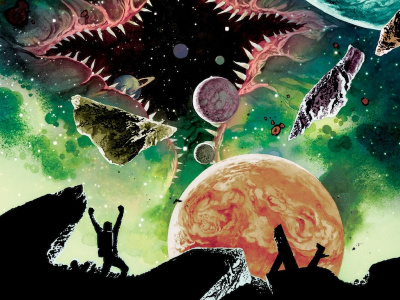Buddy Saunders of Lone Star Comics in Arlington, Texas saw the column by Steven Bennett on the contents of comics (see 'Confessions of a Comic Book Guy--Giving People What They Don't Want') and Allen N. Swords' response (see 'Allen N. Swords of Clemson University on Comic Contents'), and concurs with Bennett's view that the dark themes of comics limit sales:
Regarding Steven Bennett's column 'Confessions of a Comic Book Guy--Giving People What They Don't Want,' and the counter view, 'Taking Umbrage to Bennett Column' by Allen N. Swords, I agree with Bennett that comics are a good deal darker than they need be, to the point that sales are inhibited rather than promoted, primarily because alienation and nihilism are too often confused with art, not just by comic book creators, but by the entertainment industry as a whole, which progressively has less and less in common with ordinary people, whom the industry smugly sees as too benighted to appreciate artistic genius.
That a market exists for comics that are negative, depressing, and tend to another kind of lowest common denominator can't be denied. It's a small market, though, one that is defined almost in its entirety by themes based on violent death. The best-selling comics are those most removed from arty nihilism. They do big numbers despite their own kind of alienation lite. One need only look at a week's batch of new comics, including most of those I'd guess Bennett would say lack 'intellectual complex subjects, human conditions, and 'non-heroic' stories,' to see just how unhappy the average comic book character is today, be he super hero or otherwise.
The world is not so nearly dark and depressing and 'complex' as many comics make it out to be. Unlike those who populate the world of ink and paper, real people do smile and laugh.
In times past, comic book characters smiled, too, not just in humor comics, but all through the genres. If a character smiles in today's comics, it usually reflects a pending opportunity to inflict pain or even death on another human being. Batman once epitomized what we expect of a good police officer--the minimum use of force at all times. Today, Batman and any number of other now 'complex' heroes enjoy hurting those that 'deserve it.' Super heroes remain as super as ever, but much that was heroic has been leached from their character in the false name of art and complexity.
A long time friend and comic collector expressed a widely-held view when he told me, 'Cruelty is the answer to all problems in today's comics.' He's right, and this powerful undercurrent of cruelty informs the so-called 'complex' comics even more so than the 'mainstream' fare. Morbid, distorted, and often septic human themes may indeed be necessary to a broader understanding of art and life. But in the comics industry, especially, this is the only prism that matters.
We are left with a slick but too often empty product, one that impresses too few, and one that operates under another kind of immaturity that, ironically, renders the old kids' comics genuinely mature when contrasted with what passes for 'mature' today.
No other industry, and we are that above and before we are art, does what the entertainment industry does. A restaurant that saw declining customer traffic would look to its menu and makes changes. The owner would not stand at his door and belittle passing customers for their lack of culinary taste.
Despite the industry's tendency to marginalize itself, comic book sales are growing and may continue to grow, a trend that owes more to the beauty of the comic format than to the current wisdom of publishers and the creative community.







